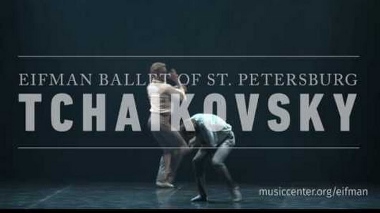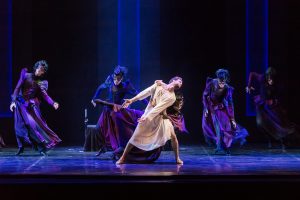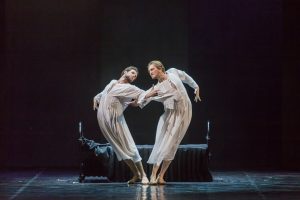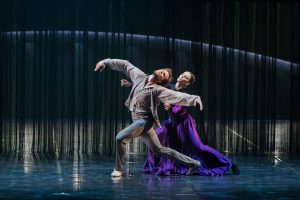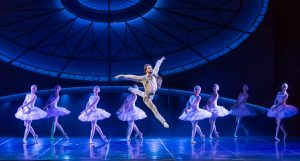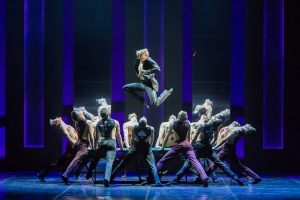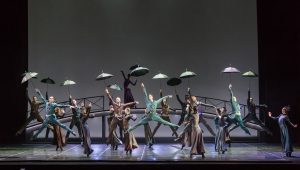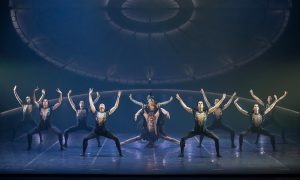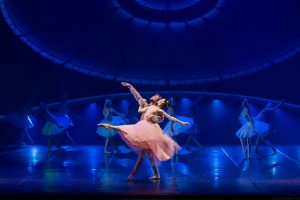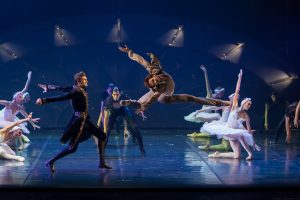UNDERSTANDING TCHAIKOVSKY
Eifman Ballet of St. Petersburg’s production of Tchaikovsky. PRO et CONTRA explores duality, loneliness and the price of fame in an emotional and technically brilliant production that takes storytelling to new heights. Artistic director Boris Eifman’s portrayal of the composer’s life through first person perspective and a doppelganger that is at his side at almost every step cleverly reflects a split mentality that never allows Tchaikovsky to be happy. Torn between internal desires and societal expectations, his tragedy is portrayed through heartbreaking movements to some of the saddest pieces of music he has written, emphasizing that success is not a substitute for true freedom.
The Music Center’s large stage served as the venue for its Los Angeles Premiere performance. The grandiose presentation included Zinovy Margolin’s large, rotating backdrops and Eifman and Alexander Sivavev’s mood-changing lighting that shone in the shape of individual lamps which would flash from gray to colorful between scenes. The company, which is known for mixing classical and contemporary ballet styles, added individualistic flair to each character. They simultaneously created a theme of movements consisting of low squats, dizzying spins and pinwheel-like canon bows blended into one cohesive theme that added to the drama in a way that acknowledged Tchaikovsky’s successes, but did not let them eclipse his personal struggles.
Oleg Gabyshev, who played Tchaikovsky, was a powerful manifestation of the tragic artist who struggles to find his place both within his private life and is a growing public figure later on as he becomes a more prominent figure in the musical world. The ballet starts with his death, after which he explores his memories as a lonely newcomer who first arrives to St. Petersburg all the way through his sudden death in early middle age, shortly after losing his wife to madness. He repeatedly wanders throughout several scenes in the show, constantly searching for a solution to his discomfort and for inspiration. His expression is whimsical when imagining a ballet come to life or worried when the characters he created manifest themselves and begin to haunt him, but rarely (if ever) does he appear happy.
Complimenting his dissatisfaction and moments of desolation wherein he cannot relate to the surroundings are open-handed arm extensions, outward kicks he directs toward the audience and the constant covering of his eyes when he is overwhelmed. During these moments, the strings in his music, among which are movements from Symphony No. 5 in E minor, Op. 64 and Serenade for strings in C major, Op. 48, escalate to a high pitch that lifts the movements to a manic frenzy, which Gabyshev executes well, eliciting deep feelings of pity for the character with every bow of his head and anguished look of helplessness when lamenting everything from his financial problems in Act II or the overwhelming presence of his double, which he clings to in times of crises.
The ballets that are explored and created within Tchaikovsky are Swan Lake, The Nutcracker, Eugene Onegin and The Queen of Spades. They allow viewers to see variations of Tchaikovsky’s personality as he appears in the form of his double (Sergey Volobuev) who frequently manifests as characters in his work: Von Rothbart, the evil villain in Swan Lake and Drosselmeyer, the kindly and magical godfather in The Nutcracker. Volobuev’s blonde hair helps differentiate him from Gabyshev, which is a small detail that helps enhance moments during which they are so well synchronized and spin around each other so quickly, it would otherwise be difficult to tell the two apart when they are dressed the same.
Volobuev is Gabyshev’s foil. His confident struts sell his role as the “ideal Tchaikovsky” Gabyshev’s character imagines himself to be. He often appears when Tchaikovsky is troubled, comforting him emotionally and sexually in positions that include Gabyshev straddling Volobuev when he is on all fours, later wrapping around his ankles as he tries to exit the stage. His neediness comes across strongly in a scene where Gabyshev appears by himself to pray during the requiem of one of his compositions. Volobuev appears shortly after to comfort him and suddenly becomes a cross against which Gabyshev’s body sinks, fully materializing Eifman’s perspective of Russia’s national treasure. Tchaikovsky is a martyr whose homosexuality has historically made him a difficult figure for the country to categorize.
The rest is an exciting mix of movement that carries the story through Tchaikovsky’s downward spiral as he grows more isolated with each passing scene. Even with his patroness, Nadezhda von Meck (Maria Abashova), one of the few bright lights in the production who encourages him to keep creating as she hands him a baton and money. A sudden change in tempo comes in the form The Queen of Spades, which can be engaging for first-time ballet viewers and veteran connoisseurs alike as they watch the dancers move on top of a tilting tabletop upon which the characters play cards and jump up to dance in a familiar squat position reminiscent of the traditional Cossack.
Tchaikovsky’s journey into the fast lane ends abruptly when his wife, Antonina Milyukova (Lyubov Andreyeva), whom he felt pressured into marrying, loses her mind. Andreyeva’s performance at the end of Act II is shockingly good. She crawls on the floor, accusing Gabyshev of destroying her life as she hits him with her scarf and later performs a high energy duet wherein with him wherein she loops his leg around her and he spins her around as she gazes with round wandering eyes demonstrating nothing but anger and confusion. The dance ends when he strangles her with her scarf, now moving into the final duet with himself (Volobuev) before suddenly dying and ending the ballet.
Milyukova’s death foreshadows his own, and reflecting an extra dimension to Tchaikovsky’s character that causes her demise and becomes less innocent and heroic in a critical moment during which one can argue the production only showed him as a victim. Eifman Ballet was already known for being choreographically stunning to see with its continuous movement and effortless way of portraying difficult routines. However this ballet elevates its characters to a point upon which they carry the story forward at the same level as the steps they perform, raising the bar for what a well-rounded story should be.
photos by Evgeny Matveev
Tchaikovsky
Eifman Ballet of St. Petersburg
Glorya Kaufman Presents Dance at the Music Center
Dorothy Chandler Pavilion, 135 N. Grand Ave
ends on June 25, 2017
for tickets, call 213.972.0711 or visit Music Center
